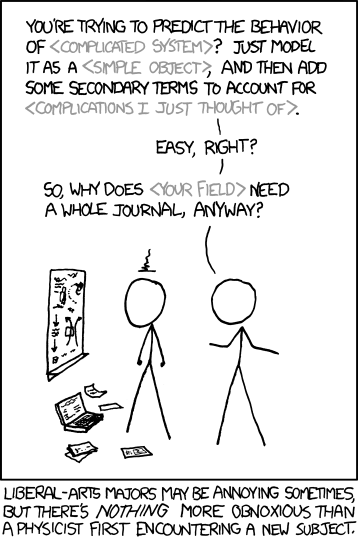Someone posted this XKCD comic on the EJMR forum in reference to my blog, specifically this series of posts ([1], [2]).
And I agree this is a pretty good takedown of physicists jumping over into other fields (this is another good one specific to economics). But it also represents a complete misunderstanding of what the posts were about and my general approach.
My actual criticism was that the RCK model was vastly more complicated than economists made it out to be (even in a graduate level textbook) and that transversality conditions were actually most of the economic content of the model. The differential equations defining the model itself were little more than accounting identities.
I hadn't just thought of the complications -- they were the primary subject of the post. Nick Rowe and commenter LAL, both economists, made the same assumption that it was just neophyte musings and I had missed the point of the transversality conditions. But again, the main point was that transversality conditions were most of the economic content of the model.
What's funny about this piece of the comic is that the entire reason I was looking at the RCK model was that I was going through Romer's Advanced Macroeconomics (the aforementioned graduate level textbook) and trying to learn economics as one would as a member of the field.
In addition, I take great pains to attempt to reproduce mainstream economic results using the information equilibrium framework. For example:
Euler equation
Asset pricing equation
Lucas islands
Diamond Dybvig
AD-AS, QTM, IS-LM, Okun's Law, Liquidity trap ...
In the end, I think economics is an interesting and complex field (hence why I spend so much of my free time working on it), not something trivial that can be solved quickly by writing down the right Lagrangian. I do think economists have framed the problem incorrectly (in terms of individual human behavior), but many economists share at least part of that criticism (problems with microfoundations).

Haha... looks like I get an "assist" on Nick's "super mad" comment, since their quote of him was preceded by "Tom:"... I did indicate I was just ribbing him. And then on EJMR there was this, in regards Nick's comment:
ReplyDelete"I wouldn't say he gets mad. Or is this mad for a Canadian?"
Someone else points out he's not a native Canadian though.
Do you suppose f2b6 is Sadowski?
"That information transfer moron is still posting crap? Remarkable persistence for a complete idiot."
Lol
It's always odd when someone keeps calling you an idiot but never references what the idiocy is. Usually someone who thinks you are an idiot for what he or she thinks is a good reason loves to point out that reason.
DeleteThe fact that I re-derive several mainstream economic models (e.g. above) suggests that the person might be a Marxist or Austrian economist.
Or it is Sadowski and he still thinks he can detrend time series data with major structural breaks without considering that it might present some issues ... or at least model dependence.
Lol... I doubt it's Sadowski actually. Doesn't sound like his style. Plus he's got a job. Maybe your first two hunches are closer.
DeleteBTW, that reminds me: I listened to a story on the radio the other day about a guy who programmed a troll-bot to harass himself (which he then made available to the general public). He could respond to the trolling with unlimited insults of his own, which he claims was psychologically therapeutic.
DeleteAs a non-physicist let me defend physicists. First of all, it seems to me that unlike virtually all other academic fields, physics is defined as the application of mathematical models to natural phenomena generally. Therefore, to complain that physicists do such things is to complain that they are doing physics. So it is a very cool thing that people who are really good at making mathematical models of natural phenomena find new types of natural phenomena to model and apply their tools to. It's only annoying if they have some insights that people slaving their whole lives studying some field did not realize before. If the models are wrong, or unhelpful, it does no damage to the field. /end rant.
ReplyDeleteIt always looks like a case of projection to me, at least when coming from economists. Economists tend to colonize other fields with abandon (that comic above could easily be interpreted as an economist talking to another social scientist), but get all bent out of shape when physicists do it to them.
DeleteAdditionally, since physics is actually pretty successful empirically there really aren't any other fields that can colonize physics in the same way ...
Sorry just reading Cosma Shalizi's rant (link above), and couldn't help reposting:
DeletePhysicists have not taken to slaughtering each other to secure faculty positions (outside of Dorothy Sucher's very amusing mystery novel, Dead Men Don't Give Seminars), nor are there many illnesses which reduce our numbers
Ha!
DeleteA good quote is this:
In a similar way, I think, the neo-classical ideal is a tolerable approximation in certain limits. Since I am writing a blog post, and not a treatise on economic methodology, I will be vague about specifying those limits, but one aspect ought to be low computational complexity, relative to the cognitive capacity of the decision-maker.
In a sense, the information transfer model is the "zero computational complexity limit" in which random actions solve the economic allocation problem.
"Where's the map of the cat?"
ReplyDelete-- Richard Feynman
(Approximate quotation.) ;)